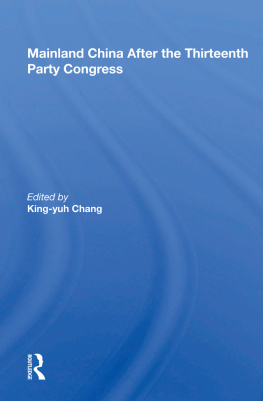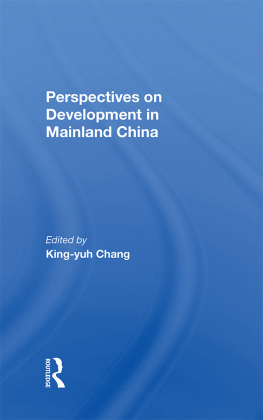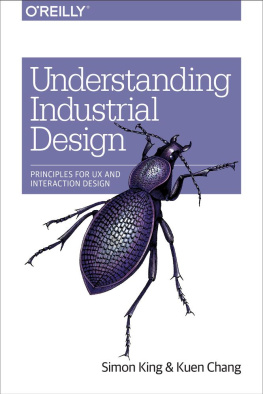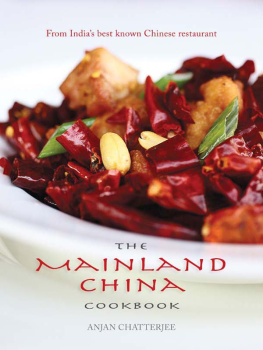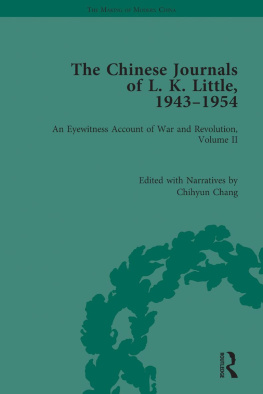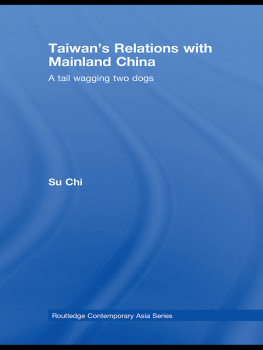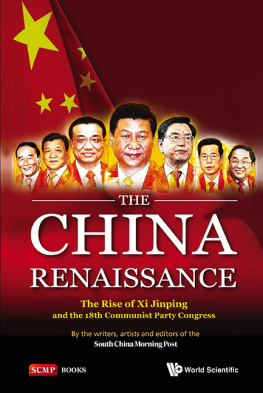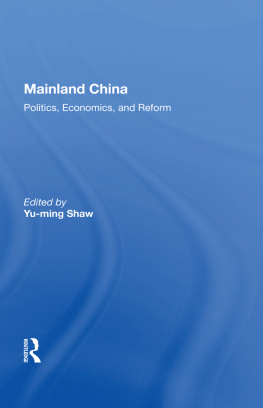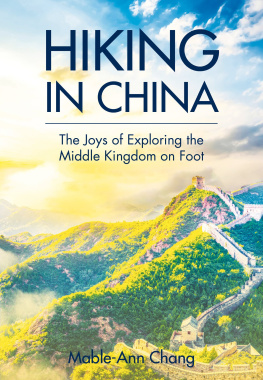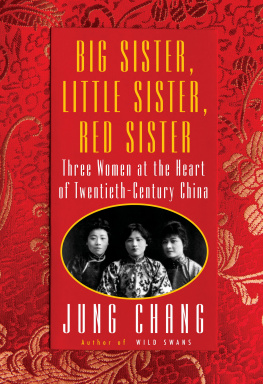First published 1990 by Westview Press
Published 2018 by Routledge
52 Vanderbilt Avenue, New York, NY 10017
2 Park Square, Milton Park, Abingdon, Oxon OX14 4RN
Routledge is an imprint of the Taylor & Francis Group, an informa business
Copyright 1990 by Taylor & Francis
All rights reserved. No part of this book may be reprinted or reproduced or utilised in any form or by any electronic, mechanical, or other means, now known or hereafter invented, including photocopying and recording, or in any information storage or retrieval system, without permission in writing from the publishers.
Notice:
Product or corporate names may be trademarks or registered trademarks, and are used only for identification and explanation without intent to infringe.
Library of Congress Cataloging-in-Publication Data
Mainland China after the thirteenth party congress / edited by King-yuh
Chang.
p. cm. (Westview special studies on China and East Asia)
Includes bibliographical references and index.
ISBN 0-8133-7869-9
1. ChinaPolitics and government1976- I. Chang, King-yuh. II. Series.
DS779.26.M32 1990
320.951dc20 90-34395
CIP
ISBN 13: 978-0-367-01355-4 (hbk)
Davis B. Bobrow , dean of the Graduate School of Public and International Affairs, University of Pittsburgh, Pittsburgh, Pennsylvania, is the editor of Weapons System Decisions (1969), coauthor of Understanding Foreign Policy Decisions (with Steve Chan and John Kringen, 1979), and the author of numerous articles in scholarly journals.
James T. Caldwell is president of Pacific Rim Connections, Burlingame, California.
King-ynh Chang is president of National Chengchi University, Taipei.
Parris H. Chang , professor of political science at The Pennsylvania State University, University Park, Pennsylvania, is the author of numerous articles and books, including Power and Policy in China (1975).
Timothy Cheek is assistant professor of history at Colorado College, Colorado Springs, Colorado. His research focuses on the role of intellectuals in modern Chinese history.
June Teufel Dreyer is professor of politics and director of East Asian programs at the Graduate School of International Studies, University of Miami, Coral Gables, Florida.
Kerry B. Dnmbaugh is an analyst in Asian affairs, Foreign Affair; and National Defense Division, Congressional Research Service, Library of Congress, Washington, DC.
Bruce J. Esposito is professor of history at the University of Hartford, Hartford, Connecticut.
John W. Garver teaches political science at Georgia Institute of Technology in Atlanta, Georgia. His most recent publication is China and the Soviet Union, 1937-1945: The Diplomacy of Chinese Nationalism (1988).
James C. Hsiung , professor of politics at New York University, New York, is the author of many articles and books, including Beyond China's Independent Foreign Policy (1985).
Paul H. Kreisberg is a senior associate at Carnegie Endowment for International Peace, Washington, D.C.
Cheng Li , a native of Shanghai, is currently a doctoral student in politics at Princeton University and has published articles in China Quarterly, Asian Survey, and elsewhere.
Kai Ma is an associate research fellow at Chung-hua Institution for Economic Research, Taipei.
Feng-hwa Mah is professor emeritus of economics at the University of Washington, Seattle, Washington.
James T. Myers is professor of government and international studies at the University of South Carolina, Columbia, South Carolina.
Donald J. Puchala is professor and director of the Institute of International Studies at the University of South Carolina, Columbia, South Carolina.
Chi Su is associate professor at National Chengchi University, Taipei, and a deputy director of the Institute for International Relations.
Ai Wei is an associate research fellow at the Institute of International Relations, National Chengchi University, Taipei.
Lynn T. White III teaches in the Politics Department and Woodrow Wilson School at Princeton University, Princeton, New Jersey. He has published books and articles about Shanghai.
Brantly Womack is associate professor of political science at Northern Illinois University, DeKalb, Illinois. He is the author of, among other works, Politics in China (3rd ed., with James Townsend, 1986) and Media and the Chinese Public (1986).
An-chia Wu is a research fellow at the Institute of International Relations, National Chengchi University, Taipei. He has written many articles and books on mainland Chinese politics.
Kung-chia Yeh is a senior economist at the RAND Corporation, Santa Monica, California.
Milton D . Yeh is an associate research fellow at the Institute of International Relations, National Chengchi University, Taipei.
Po-tung Yeh is a research fellow at the Institute of international Relations, National Chengchi University, Taipei.
Y-lin Y is an associate research fellow at the Institute of International Relations, National Chengchi University, Taipei.
Policy and personnel changes in mainland China, which are sometimes unpredictable, are a perennial focus of attention for scholars and political analysts. In order to gain a better understanding of the situation in mainland China, scholars from the Republic of China on Taiwan and the United States meet once a year for the Sino-American Conference on Mainland China. This volume contains chapters based on material presented at the Seventeenth Sino-American Conference, from June 6-9, 1988, in Taipei. The conference attracted forty-nine U.S. and eighty-one Chinese participants and elicited papers covering a wide variety of topics, all centered around the theme of "Communist China After the Thirteenth Party Congress."
On the relationship between ideology and politics in mainland China, the authors raise the following three questions: Will the Chinese Communists be able to find a rationale in the works of Marx and Lenin for their economic reforms? Will economic reform lead to a qualitative change in the Chinese Communist regime? Will the differences between the reformist and the dogmatist factions degenerate into a new power struggle? An-chia Wu points out that the greatest obstacle confronting the Chinese Communist leadership's reform effort is the widespread skepticism that has resulted from the lack of a clear-cut theoretical basis for such reform. It is this skepticism that has prompted the formulation of the theory that mainland China is now in the initial stage of socialism.
Concrete measures adopted in this stage to enhance productivity include allowing people to lease agricultural land, run private businesses, hire labor, and make income from sources other than labor and opening more coastal areas to foreign investment. Although this theory may help Chinese Communist Party (CCP) members to come to a common understanding about the necessity of the reform and opening-up policy, it has also created some theoretical problems. Today, more than thirty years since the Communists came to power, many mainland Chinese are disheartened to realize that they are still in the initial stage of socialism. Others believe that the initial stage theory is, in fact, a retrograde step in mainland China's development, or that it damages the ideological basis of socialism. The divergence of opinion among cadres indicates that the new theory still lacks a solid basis. In fact, it has seldom been mentioned by the Peking leadership since the dogmatist faction gained the upper hand in the power struggle at the Third Plenary Session of the CCP's Thirteenth Central Committee, held in September 1988. There was no mention of the theory whatsoever in the communiqu of the Fourth Plenary Session, held shortly after the Tienanmen massacre of June 4, 1989. Since the Chinese Communists are now showing open hostility to Western ideology (or "bourgeois liberalization," as they term it) it is unlikely that the theory of the initial stage of socialism will continue to serve as theoretical guidance for mainland China's reforms. Just as Wu says in his paper, although the purpose of the theory is to rationalize the nonsocialist elements existing in mainland China today, it has failed to extricate the regime from theoretical confusion regarding socialism and capitalism. Obviously, the reform and opening-up policies can be successfully implemented only if the Chinese Communists are willing to discard outdated Marxist-Leninist doctrines.


